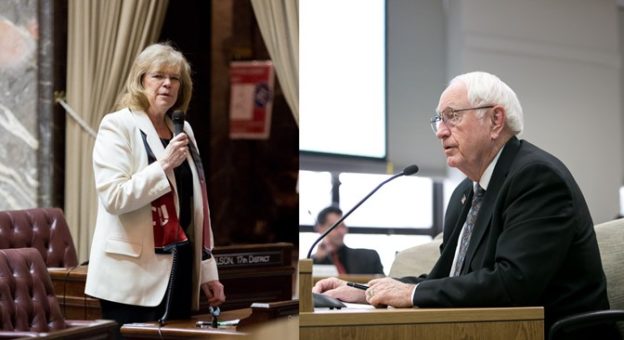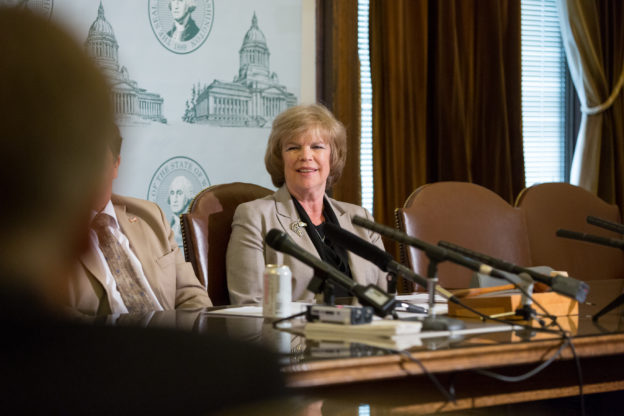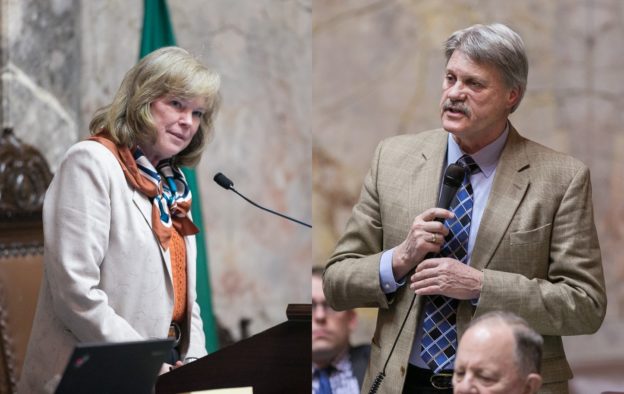Capital budget approved; provides unprecedented support for education
After nearly a year of negotiations, Sen. Judy Warnick, former chair of the Senate’s water-related committee and lead negotiator on the bill to fix the flawed Hirst court decision, believes the compromise deal reached this week by Senate and House negotiators will finally bring needed relief for rural families seeking to drill a small household well.
“It has been an arduous and complex negotiation,” said Warnick, R-Moses Lake. “I believe that the compromise we have reached meets the criteria that I stated at the end of last year, namely that any solution must not be a burden on rural families who simply need water to build a home.”
Sen. Shelly Short, R-Addy, joined Warnick in the negotiation talks.
“We had many hours of meetings that went late into the night over this week,” Short said. “Our stance from the beginning was that we needed a bill that would treat our rural landowners fairly so they can drill water wells on their land. Without water, landowners can’t develop their property. The compromise we reached isn’t a perfect fix to the problem, but it’s a solution that allows locally driven plans with flexibility to develop solutions tailored to meet local needs.”
“It has taken us this long to get here because many in Olympia didn’t take the plight of rural Washington seriously,” Warnick said. “We did what we had to do to represent our constituents and get the attention of urban lawmakers who don’t need to worry about where their water comes from.”
Engrossed Substitute Senate Bill 6091, sponsored by Sen. Kevin Van De Wege, D-Sequim, and Warnick, passed the Senate 35 to 14 and the House of Representatives 66 to 30.
“I’m glad that Senator Van De Wege stepped up and supported our efforts to help rural families,” said Warnick. “This is an example of collaboration among Democrats and Republicans to work for all of Washington.”
Senate Republican leaders had insisted since early April, 2017 that there would be no new capital budget without a long-term remedy for the effects of the Hirst ruling. Adoption of the Hirst fix cleared the way for the Legislature to adopt the state’s capital budget.
“This budget is designed with Washington students in mind,” said Sen. Jim Honeyford, R-Sunnyside and the lead Senate Republican for the capital budget. “It invests an historic level of support for K-12 reforms.
“In addition to education, we prioritize projects that focus on helping meet our state’s mental-health needs, mitigate the damage of environmental disasters and preserve and develop existing properties – all while leaving capacity in the budget to address unforeseen future needs.”
The $4.2 billion spending plan for funding capital assets like school-building construction and mental-health facilities during the 2017-19 biennium, includes a total of more than $1 billion K-12 education-facility construction, renovation or modernization.
The capital budget includes $860 million in total appropriations for higher-education facilities, including $489 million in general-obligation bonds. Of the total spending authority, $433 million would go to the community and technical college system and $428 million to Washington’s public four-year institutions.
The state’s water needs are also an area of emphasis. The budget contains $160 million for flood-control and water-supply projects, and well as $165 million for drinking-water loans and grants, $220 million for the Water Pollution Control Revolving Program and $35 million for the Centennial Clean Water Program. It also contains $300 million for Hirst-related projects.
Mental-health needs, another priority for Senate Republicans, would receive $132 million in the budget. There is approximately $90 million in community behavioral health projects and another approximately $42 million in state hospital projects.
Other highlights of the capital budget include:
- $97 million to fund the current Public Works Assistance Account list in its entirety;
- $8 million for Community Economic Revitalization Board (CERB) grants;
- Nearly $100 million for affordable housing, including $12 million for innovative housing projects;
- $80 million for select Washington Wildlife Recreation Program projects; and
- $13 million for forest-hazard reduction.
The capital budget passed the Senate 49-0 and the House 95-1

 Investing in our community
Investing in our community




















